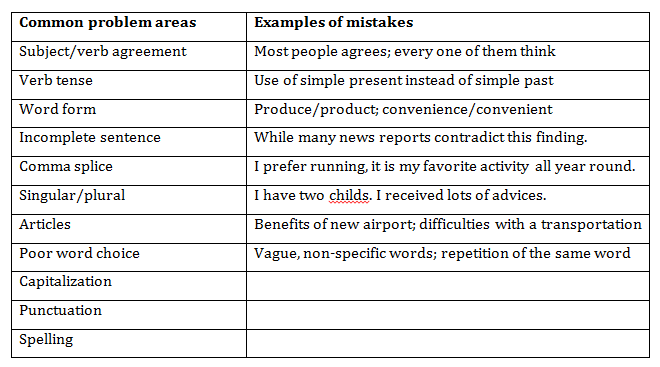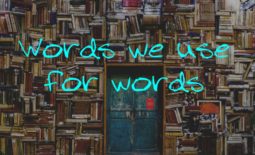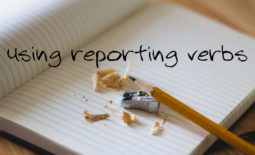Improving your writing on your own
When you’re on your own, you can quite effectively improve your receptive language skills like reading and listening as well as your grammar and vocabulary. But what about productive skills like writing and speaking? These skills require you to produce something … text or speech … yet how do you evaluate and improve these abilities all by yourself?
This article has some suggestions for improving speaking fluency. Now I’d like to discuss improving your writing.
Most of my students are preparing for TOEFL iBT Writing so let’s talk about that. (Many of these tips, however, can be applied to any sort of writing.)
What can you do, on your own, to improve your writing and get a higher score? In my opinion, just writing essay after essay is definitely not the only and probably not the most effective way to achieve this goal.
Improve your typing
This would seem obvious, but being a slow typist is really going to hurt you when time is of the essence.
I was lucky, because my mother forced my brother and me to take a typing class one summer many years ago. Like riding a bike or swimming, once you learn to type quickly and accurately, it’s a skill you never lose.
First, test your current typing speed. I Googled “typing speed test” and found lots of hits. At this website, I took a three-minute test and tested at 64 WPM (words per minute) with 98% accuracy. Both speed AND accuracy are going to be important on TOEFL Writing. You want to get your ideas down as quickly as possible. And because your rater won’t be able to distinguish between typos and spelling/grammar mistakes, you also want to type accurately. Furthermore, you won’t have that handy spell check and autocorrect to help you!
What is a good typing speed to aim for? According to Mr. Google, 40 WPM is average; anything above that is better. The website mentioned above along with many others offer lessons that can help you to improve your speed. And the satisfying thing about working on your typing skills is that improvement is easily measured and usually happens fairly quickly.
Brainstorm ideas
Many of my students struggle coming up quickly with three main points for the TOEFL independent essay. Yet I find that I can usually generate multiple ideas within a minute or two. Therefore, I think it’s safe to say that this is a skill that can be improved with practice.
Instead of writing a whole independent essay, just brainstorm the topic and see how many different ideas you can generate quickly. Try using both the 100% and 50/50 strategies. Find various topics in TPOs (TOEFL Practice Online) or TOEFL study guides.
Let’s take this topic (TPO 50) as an example:
Do you agree or disagree with the following statement?
All university students should be required to take history courses no matter what their field of study is.
Use specific reasons and examples to support your answer.
So I could first try generating at least three points that are 100% for or 100% against. Try to think of a minimum of three, but keep going if you can … when you’re actually writing the essay, being able to choose the best three, and not the only three will be a great help. The three you choose should be the points that you can support the most effectively and quickly.
In favor of requiring history courses:
- Knowledge of your country’s history makes you a better citizen.
- Greater knowledge of history can make you appear more intelligent.
- Knowledge of world history helps you if you need to interact with other nationalities.
- Studying history requires good reading and analytical skills that help in lots of different fields.
- Studying history helps you understand and appreciate literature and art better.
- The best universities offer a liberal arts education which requires studying history as well as other fields like literature and social sciences.
Against requiring history courses:
- Most high schools teach enough history to cover the necessities.
- Required history classes would create too much work for university students who are already busy enough.
- History is not relevant to some fields like engineering and computer science.
- Students can learn history on their own by reading books.
- History professors may be biased and even provide students with misinformation.
- History is not relevant to our society today; it’s the future that matters.
Next you could generate ideas for a 50/50 strategy, meaning that whether students should be required to take history depends on factors such as:
- The type of university (liberal arts colleges usually require history; specialized schools like engineering colleges may not)
- The depth/quality of history instruction in high school (if instruction is good in high school, then not necessary in university)
- The availability of qualified history professors (does the university have enough professors to teach all students?)
- The quality of instruction in history at the university (are the history professors good, unbiased, well-trained?)
- The relevance of history to their field of study (not relevant for computer science, might be relevant for business majors who want to work abroad)
- Type of history taught (world history not important; history of country is)
Each point that you generate would be used as the main idea of a paragraph and would be presented in the topic sentence of that paragraph. But in addition, you should also practice brainstorming ideas to support each of these points. These ideas would be the supporting details included in the rest of that paragraph. For example, let’s take the very first point:
- Knowledge of your country’s history makes you a better citizen.
You could quickly write:
- learn more about how a democracy functions
- get a better understanding of our political parties
- make more informed decisions at the voting booth
- gain more pride in our country; also understand its missteps and mistakes
Finally, as you generate ideas, remember that always, always, always it’s better to be specific and focused. For this particular essay topic, don’t write about university students in general. Center all your points and supporting ideas around university students in your particular country. If your country isn’t a democracy, for example, the supporting ideas above would make no sense.
Write. Rest. Correct Errors.
In addition to working on your typing and generating ideas, there will also be times when you practice writing on your own by … surprise! … actually writing something! When you do this, I recommend a three-step process of writing, resting, and error correction.
- When you’re practicing for the TOEFL iBT, I think it’s best to follow the requirements of the specific writing task. For example, for the independent essay, you should give yourself exactly 30 minutes from start to finish. If possible, you should do a quick proofreading toward the end of your 30-minute writing time. More intensive error correction comes later.
- Next I recommend that you set your writing aside for a while. I find that when I’m too “close” to my writing, I can’t read it objectively. And yet that’s what you need to do to correct it effectively. I recommend doing the error correction the following day.
- Error correction basically involves trying to spot (and figure out how to fix) as many errors as possible in your written work. This is more than a quick proofread because you’re really going to focus on your written work and identify every single error you’ve made. Obviously, if you don’t know it’s an error, you won’t be able to spot it.
To catch more errors, read your work out loud. Scan each sentence carefully. Does it have a subject and verb? Do subjects agree with verbs? If there is a dependent clause (beginning with a subordinating conjunction like because, when, if), is there also an independent clause? Did you use the correct tense? Are you connecting sentences with commas (which is incorrect) rather than punctuating with semicolons or periods? Did you use the correct form of each word? Is there a better, more specific word you could have used instead?

Finally, once you’ve identified as many errors as you can, use a subsequent study time to focus on one specific area, whatever seems to be a particular weakness for you. Two websites that I recommend for grammar are:
For general help with writing, try:





The TOEFL independent essay
March 31, 2019 @ 10:40 am
[…] TIP: Always save time at the end to proofread your work. So many students’ essays that I read suffer from unnecessary language use problems (subject/verb disagreement, improper tense, incomplete sentences), punctuation mistakes, weak vocabulary or word form errors, and misspelling. I say “unnecessary” because the students, when they reread their work, recognize the errors without my pointing them out. Although your essay doesn’t have to be perfect to get a top score, you want to avoid as many of these mistakes as you can. Far better to keep your essay on the shorter side, and leave enough time to make as many corrections as you can in the last five minutes. Reading your essay aloud (in your head) may help you to identify these mistakes more easily. Error correction is also a useful skill that you can work on when practicing by yourself. […]